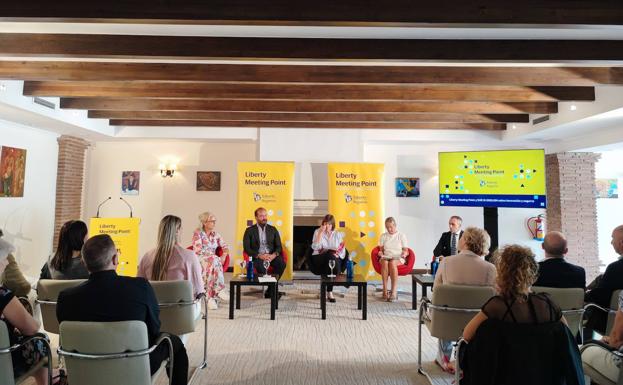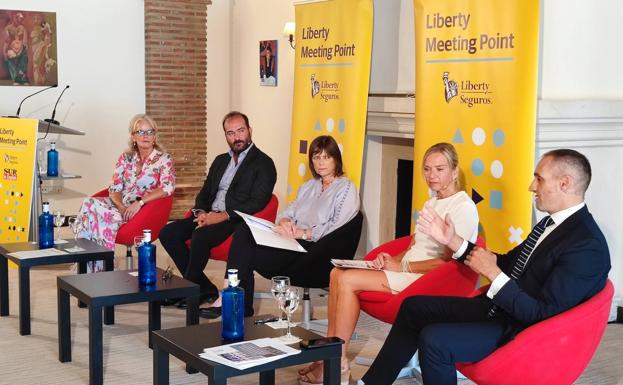Uncertainty caused by Brexit and the pandemic has increased the need for advice among the British population in Spain
‘Expectations and insurance needs of the new profiles of British residents in Spain’. Taking part in the meeting were Ilse Burggraaf, the head of Hypotienda Insurance Agency; Daniel Moreno, Spain Distribution Senior Manager at Liberty Seguros; Katja Thirion, the head of the Foreigners Department at Mijas town hall and Antonio Flores, director of Lawbird Spanish Lawyers
Thursday, 20 October 2022
Malaga province remains a favourite destination for many foreigners, especially the British, who choose it as a location for a second home or even decide to move here permanently.
One of their preferred destinations within the province is Mijas, which historically has had a British community whose members have stayed even in adverse circumstances, such as those at present, marked by the uncertainty caused by Brexit and the pandemic.
For this reason SUR in English and Liberty Seguros organised a meeting this week on the subject of Expectations and Insurance Needs of the New Profiles of British Residents in Spain, to answer questions and provide support for these residents.
Taking part in the conference, which was held at La Cala Resort and moderated by SUR in English editor Rachel Haynes, were Ilse Burggraaf, the head of Hypotienda Insurance Agency; Daniel Moreno, Spain Distribution Senior Manager at Liberty Seguros; Katja Thirion, who runs the Foreigners Department at Mijas Town Hall; and Antonio Flores, director of Lawbird Spanish Lawyers.
The meeting was opened by Arancha López, the Councillor for Foreigners in Mijas. She said that Mijas is a municipality open to the world and its population includes more than 127 different nationalities. The British community is the most numerous, with around 10,000 residents, making Mijas the municipality in Andalucía with the largest number of British residents.
Unsurprisingly, López pointed out, Mijas was the first place in Spain to open a department specifically for foreigners, 35 years ago, and it still informs and assists people today. This is essential when they need official, reliable information to prevent them falling for scams that can occur in these situations. It is only right to provide such assistance, she said, because for Mijas “they are our English-speaking ‘mijeños’”.
During the meeting the situation of uncertainty and therefore vulnerability currently experienced by many British people in Spain was discussed. As Katja Thirion explained, a great many people “have no idea of the procedures they are supposed to follow and they feel very alone and unable to regularise their situation, which affects their day-to-day life and future in this country”.
On the same issue, Antonio Flores said that after Brexit, “the British are in the same situation in this country as people from North Korea are, for example. The procedures they have to go through as non-Europeans are complicated and there is a great lack of knowledge”.

As an example of these difficulties, he referred to the way the time for short stays in Spain has to be worked out, because of the ‘Schengen calculator’. He said there are numerous hoaxes regarding this, including claims that people will be deported if they spend more than the maximum number of days permitted, something which he said “is not usual unless there are special circumstances, such as them having been involved in a fight or conflict”.
He did emphasise, however, the anxiety that this causes to foreigners and how that influences their investment in this country, among other questions.
“The British need to be aware that they have a different status now. There are a lot of questions that need answers and sometimes the law doesn’t provide them because each case has its own characteristics and in the end it depends on officials and their attitudes,” he explained.
At this point in the meeting, journalist Rachel Haynes said that Brexit had meant that “many people who spent long periods of time in Spain had to decide whether or not to become resident”.
With regard to this Ilse Burggraaf reflected that, with the doubts that had arisen over matters such as healthcare and property, many people had decided to sell their homes because they didn’t know what their legal situation would be, and that was a very sad thing for them to do. “They feel helpless and that is a shame because the British have been the biggest and most important community in Spain,” she said.

“A lot of people decided to sell their houses because they didn’t know what their legal situation would be, and that was a very sad thing for them to do”
Ilse Burggraaf
Head of Hypotienda Insurance Agency

“The most important figure in these cases is the professional insurance agent, who helps people to choose the best option for their situation”
Daniel Moreno
Spain Distribution Senior Manager at Liberty Seguros

“Our work to advise British citizens is essential because many of them feel very alone and unable to regularise their situation in this country”
Katja Thirion
Head of the Mijas Foreigners Department

”British people need to be aware that they have a different status now and there are a lot of questions that need answers”
Antonio flores
Director of Lawbird Spanish Lawyers
Despite this, Thirion said that although the numbers on the population register had dropped in Mijas, it had not been as bad as anticipated.
“In 2018 there were around 10,000 and now it is about 9,000 because the number has gone up a bit in recent months. A lot of young families have come with visas and everything prepared. It’s true, as Ilse says, that many people did sell their properties but others are coming who can work remotely and are looking for quality of life, especially British, Scandinavians and Belgians,” she said.
Daniel Moreno agreed, and said that at Liberty Seguros they had been very worried in 2020 because for the company “the European and British clients are very important and they have a very different and characteristic profile”. He said they had expected a “perfect storm between Brexit and the pandemic” which would paralyse a large part of the business of the main products, which are motor, household and life insurance. Despite this, he said, “It was a bad year, and so were the first six months of 2021, but after that the fall was not so drastic and this year there has been an important recovery. It is true, as Katja said, that there has been a change in the profile of insurance clients. More Scandinavians, French and Belgians, and not just in home insurance but also vehicles and other properties. And that has not been to the detriment of the number of British clients, which fortunately has remained the same.”
He also agreed that the average age of policyholders has changed from pensioners to much younger people, such as “families who work from home and decide to do that somewhere like Spain with all that it has to offer, and that also affects the type of insurance product they are going to need because they have other requirements,” he said.
On the subject of working from home, Rachel Haynes raised the question of legal problems that could arise for families who come to live in Spain, send their children to school in Spain but maintain their occupation in their country of origin, in other words “digital nomads”. In reply, Flores said that could be a stumbling block because “at present there is no specific legislation for such people; they have to apply for a work permit on a self-employed basis and with a project which is probably not aligned with their interests. There is a lot of bureaucracy and that slows everything down for people from outside the EU,” he explained.

Another issue covered during the meeting was healthcare, which Katja Thirion said was easier for pensioners because there were already agreements on this. “The problem is that in the United Kingdom there is total confusion. There are pensioners who are given an S1 but are then told that it only applied pre-Brexit. In the end each case is assessed individually but it is difficult to give a standard response and we don’t hold any powers regarding foreigners - we are an information department, so they have to get in touch with Social Security or Hacienda for more specific issues,” she said.
Ilse Burggraaf agreed, and said that “what people are asked for in Mijas or Marbella is not the same as in Alicante”.
Antonio Flores said some consulates are asking for an annual health insurance policy. “This is very important, because not having had uninterrupted health insurance for the required period of time is a reason for their application to renew their residence permit to be immediately rejected,” he stressed.
As experts in their field, at Liberty they know from experience that the most important figure in these cases is the professional insurance agent who helps people to choose the best insurance structure for their situation. “There are about 200 health insurance companies in Spain, a lot of supply on the market, and there has been an absolute boom in this field. But when it comes to choosing, it is essential to have someone who is informed and knows the context perfectly in order to find the best solution for the client,” Daniel Moreno explained.
The issue of driving was also discussed, and it was agreed that many UK licence-holders are driving around in fear because there is no recognition of their licences until the promised bilateral agreement is signed. Meanwhile, the law says they have to take a test in Spain to drive legally.
“The rules aren’t clear even for the officials. There is no sense in a British person having to take a test here because the process is very similar in their country, they have to pass a test which is much the same, not like the United States for example,” said Burggraaf. Antonio Flores also said it is very important not to be fooled by unauthorised people who offer international driving licences because these are false and the legal consequences could be very expensive. The speakers also stressed that motor insurance has to be for a full year, even if the policyholder is not in Spain for that amount of time.
With regard to the confusion that can arise about this, Moreno explained, “The British have always been right at the forefront when it comes to insurance. They have been pioneers in types of motor insurance, for example with different temporary policies according to the needs of the insured, but these have not really taken off in Europe, perhaps due to social differences, and the law obliges drivers to have an annual insurance. That’s why a good professional agent is needed to advise people and give them the correct information,” he said.
The last issue discussed was the right of British residents in Spain to vote in council elections, something that changed after Brexit. Katja Thirion reminded people that they will have to register their wish to be on the electoral list although the procedure is not yet known. “The authorities have told us they are going to send an informative letter, but everything is still up in the air and British residents could lose an important right. If they receive the letter there is no problem but the time limit is short, from December to January. And if they don’t receive the letter they are in limbo and there is a great deal of uncertainty about what is going to happen,” she said.
Closing the meeting, Daniel Moreno of Liberty Seguros thanked all the British clients for their confidence in the company and said its team of professional intermediaries is strongly committed to expatriates. They all have the training, qualifications and exhaustive knowledge of the legislative framework and the peculiarities of people’s situations to ensure their quality of life and peace of mind, he said.
